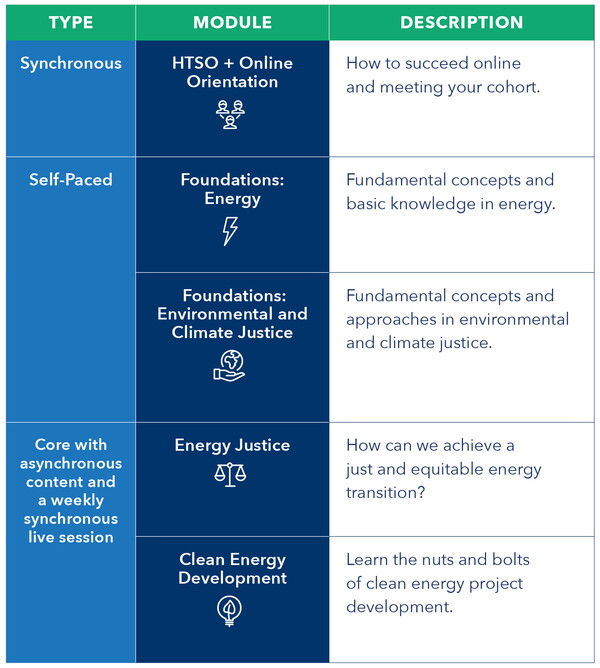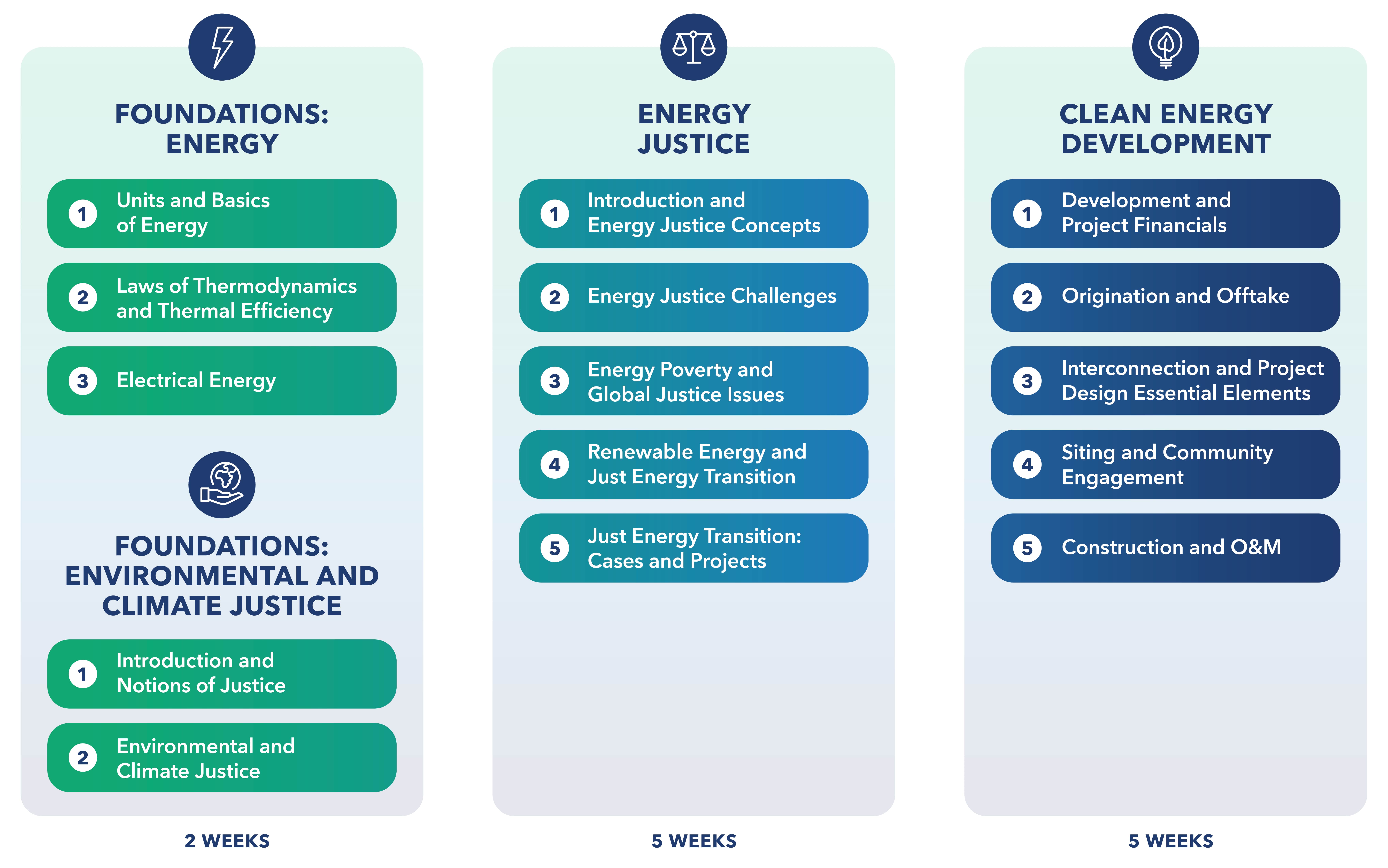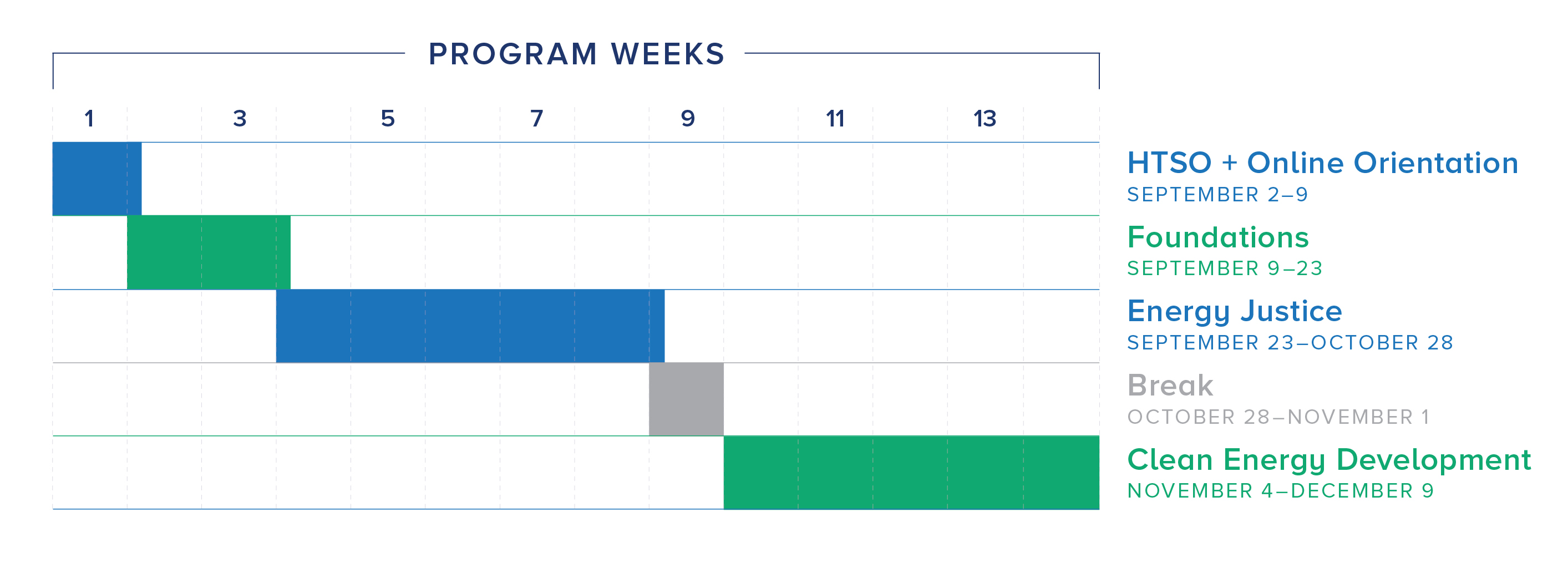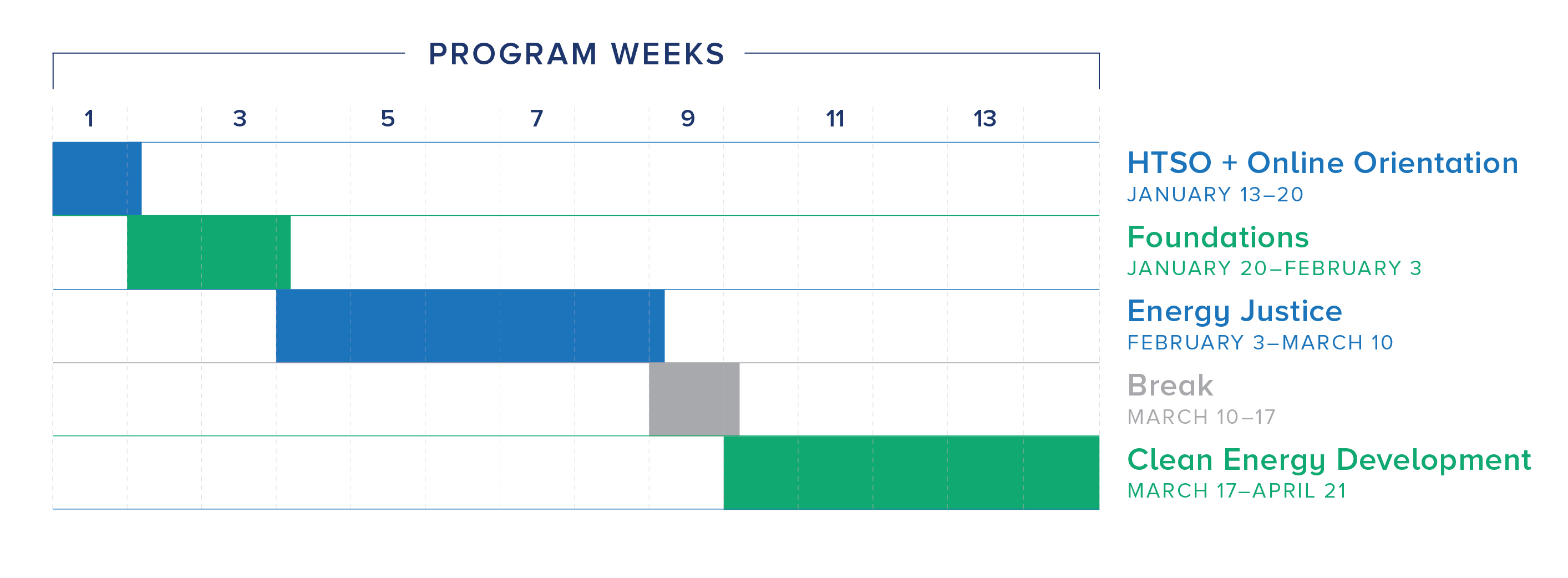Clean and Equitable Energy Development Certificate Program
Courses Structure
The CEED program consists of:
- a self-paced How to Study Online Course
- a two-hour Online Orientation session
- two self-paced Foundations Courses ("Foundations: Energy" and "Foundations: Environmental and Climate Justice" - two weeks in total)
- two five-week Courses delivered at the same pace to the whole CEED cohort.
All online course material is made accessible through Yale's online learning platform, Canvas. Admitted participants receive a link to the Canvas platform on the day the How to Study Online Course opens.
Courses Overview
How to Study Online
The program will kick off with a short module titled "How to Study Online". This asynchronous and self-paced course will give participants access to all the program platforms and provide advice for succeeding in the program. It takes approximately two hours to complete and can be done completely asynchronously.
Online Orientation
The cohort will convene online for the first time during Orientation. Participants will meet their peers and learn the basics of successfully collaborating online with the teaching team. There will also be time for participants to ask any remaining questions before we get started!
Orientation will be delivered over Zoom for approximately 2 hours. Participation in Orientation is required. Because Orientation activities include the use of breakout rooms and social activities, the session will not be recorded.
Foundations (2 weeks)
All the Foundations Course materials are made available at the same time and take approximately 15 hours to complete in total. While you will be able to interact with fellow participants, the two courses are designed for you to go through it on your own, without feedback or input from your instructors.
Foundations: Energy
- Bring you up to speed on the basics of energy concepts.
The "Foundations: Energy" course is required for all participants unless you opt out based on the results of a very short placement test when the course opens. Participants who opt out are still encouraged to take the course.
Foundations: Environmental and Climate Justice
- Build a common vocabulary in justice, environment, and energy.
- Examine fundamentals in race, power, intersectionality, indigeneity, decolonization, ideas and frameworks of justice, recognizing structural inequity, and the origins of social, environmental, and climate justice movements.
The "Foundations: Environmental and Climate Justice" course is required for all participants. There is no opt-out option available.
Energy Justice (5 weeks)
- Examine problems within the energy sector, diving into scale, intersections, and governance of the problems.
- Examine restorative and voice-centering approaches to justice and how we can advance a just and equitable clean energy transition.
- Dive into a case study on: renewable energy development, transportation, public health, historical inequities of indigenous land dispossession, and global justice issues.
The "Energy Justice" course is the first of two core courses in the program, lasting 5 weeks. Each week, on Monday midday, new content will be made available to participants, with most assignments due by the following Monday. These asynchronous content include short lecture videos, quizzes, readings, discussion questions, and other assignments. In some cases, optional content and/or extra credit opportunities will be provided.
On Tuesdays at noon EST, participants are required to join a 90-minute live session on Zoom to engage in a synchronous lecture, panel, discussion, or other group activity. Optional office hours with the teaching team will also be offered at various times in the week.
Clean Energy Development (5 weeks)
- Dive into everything you need to consider to bring a clean energy project from conception through to development:
- Introduction and Identifying / Creating Markets,
- Site Selection, Land Control, and Scale,
- Principles for a clean, affordable, just, and equitable energy project,
- Interconnection,
- Community Engagement - Consultation & Free, Prior, and Informed Consent (FPIC),
- Permitting, and policy & legal requirements and opportunities,
- Origination and Marketing,
- Financing and Investment,
- Construction and Operations & Maintenance.
The "Clean Energy Development" course is the final core course of the program, lasting 5 weeks. Each week, on Monday midday, new content will be made available to participants, with most assignments due by the following Monday. These asynchronous content include short lecture videos, quizzes, readings, discussion questions, and other assignments. In some cases, optional content and/or extra credit opportunities will be provided.
On Tuesdays at noon EST, participants are required to join a 90-minute live session on Zoom to engage in a synchronous lecture, panel, discussion, or other group activity. Optional office hours with the teaching team will also be offered at various times in the week.
Academic Calendar
-
Fall 2024
-
Spring 2025
Learning Methods
Learning Opportunities
Unlock a world of endless possibilities as a CEED participant and embrace learning beyond the confines of the virtual classroom! Immerse yourself in a vibrant community of thought leaders at the renowned Yale School of the Environment and the prestigious Yale School of Management, where virtual and in-person conferences and workshops await your eager participation.
Prepare to be inspired by your peers in the dynamic field of clean energy. You'll be joining the Yale Clean Energy Collaborative, a growing group of folks in the Yale community working in the clean energy space. Via our private social networking platform, you'll be able to connect with Yale students, staff, faculty, Yale alumni, FDCE participants and all cohorts of the CEED program. You'll also have a dedicated space within the platform to engage with your own cohort.



